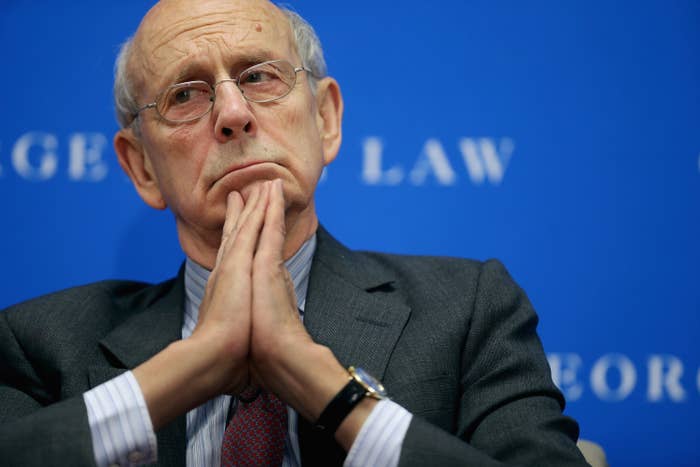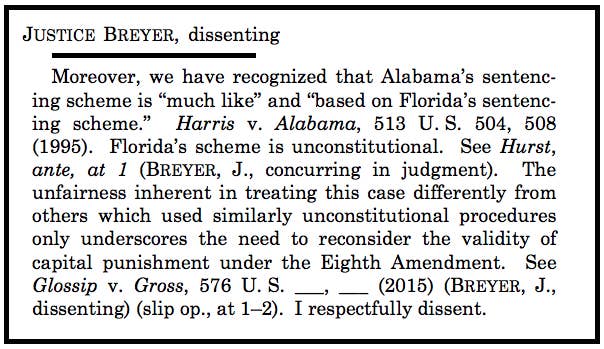
WASHINGTON — Justice Stephen Breyer reiterated his call for the Supreme Court to reconsider the constitutionality of the death penalty on Thursday night, just hours before the justices are due to consider hearing a case that could do just that.
The comments came in response to Christopher Brooks's request to the justices that they halt his pending execution in Alabama. The court denied the request, but Breyer objected — noting in a short, two-paragraph statement that he would have granted the request.
Breyer went further, though, stating that the treatment of Brooks's case "underscores the need to reconsider the validity of capital punishment under the Eighth Amendment."
This past June, Breyer dissented from the court's decision in Glossip v. Gross upholding Oklahoma's use of the sedative midazolam in executions. He joined a dissenting opinion by Justice Sonia Sotomayor that detailed why the four more liberal justices believe Oklahoma's use of midazolam was unconstitutional. Breyer went further though, writing a second dissenting opinion — in which he was joined by Justice Ruth Bader Ginsburg.
"But rather than try to patch up the death penalty’s legal wounds one at a time," he wrote, "I would ask for full briefing on a more basic question: whether the death penalty violates the Constitution." He then spent 40 pages explaining why the court should do so, concluding, "I believe it highly likely that the death penalty violates the Eighth Amendment."
Since that time, some advocates have taken the dissent as a sign that the time is now to get a case before the justices that would allow them to take such a step. Others, most recently the Brennan Center's Andrew Cohen, call a belief that the death penalty could be nearing its end "implausible."
Breyer had not written further about his call in any of the death penalty cases the court has had before it since then — even in cases where his call was specifically referenced. Thirteen executions had been carried out between the court's opinion in Glossip and Thursday morning.
Breyer chose Brooks's case — in which Sotomayor and Ginsburg noted that, despite questions about Alabama's death sentencing scheme, "procedural obstacles" ultimately would have kept the court from overturning his death sentence — as the moment to raise the issue again. He referenced those procedurals obstacles — noting that he had opposed the court's decision putting those obstacles in place in the first place — but then returned to his Glossip dissent.

Although he did not explain why he chose now, and not any of the prior 13 executions, to raise the issue, Thursday's statement came as the justices are due to consider Shonda Walter's request out of Pennsylvania that the court reconsider the validity of capital punishment under the Eighth Amendment.
The justices initially were scheduled to consider Walter's petition on Jan. 15 at their private conference, but, with no explanation given, the case was rescheduled to be considered at another time. On Tuesday, it was set to be considered at Friday's conference.
Walter's case comes to the court on direct appeal after the Pennsylvania Supreme Court upheld her conviction — a distinction from the other, last-minute requests that have raised the question since Breyer's dissent this past June. In presenting Walter's case, her lawyer told the justices: "Shonda Walter is an African American female, and the last woman on Pennsylvania’s death row. Her case exemplifies what is wrong with the death penalty."

The petition goes on to detail issues raised in her case, from the legal counsel she had at trial to her treatment in prison to the progress of her appeals to claims of arbitrariness and racial discrimination throughout the process.
"The death penalty has outlived any conceivable use," Walter's lawyer, Daniel Silverman, writes in the petition. "It is imperfect in application, haphazard in result, and of negligible utility."
Although it is possible that word of the outcome of the justices' consideration of Walter's petition could come on Friday, that is unlikely — unless there is a concerted effort to expand the court's calendar in order to hear the case this term.
More likely, the soonest the outcome of the consideration will be known would be if the justices decline to take up Walter's case. In that situation, the denial of certiorari would be noted in the orders scheduled to be released on Monday, Jan. 25.
If, however, the justices are considering taking Walter's case, they are likely — in accordance with the court's usual, though not exclusive, practice over the past few terms — to re-list the case for their next conference before granting certiorari.
That itself adds another question to the mix. The justices' next conference is not until Feb. 19 — by which time at least one more petition seeking a full reconsideration of the constitutionality of the death penalty, in a case out of Louisiana, is expected to be before the justices.
